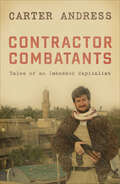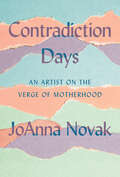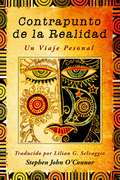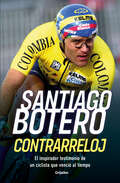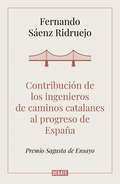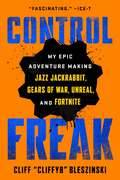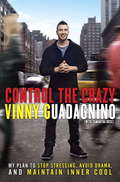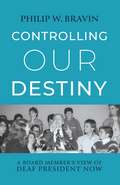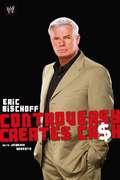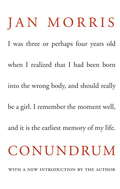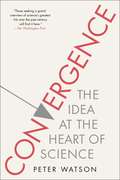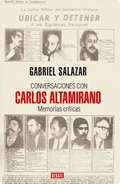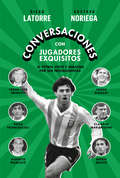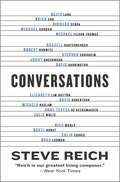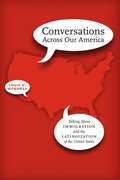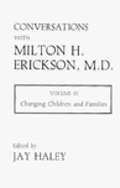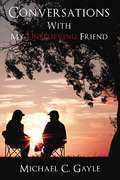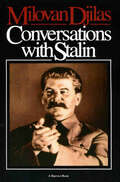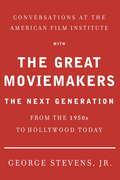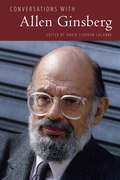- Table View
- List View
Contraband
by Michael KwassLouis Mandrin led a gang of bandits who brazenly smuggled contraband into eighteenth-century France. Michael Kwass brings new life to the legend of this Gallic Robin Hood and the thriving underworld he helped to create. Decades before the storming of the Bastille, surging world trade excited a revolution in consumption that transformed the French kingdom. Contraband exposes the dark side of this early phase of globalization, revealing hidden connections between illicit commerce, criminality, and popular revolt. France's economic system was tailor-made for an enterprising outlaw like Mandrin. As French subjects began to crave colonial products, Louis XIV lined the royal coffers by imposing a state monopoly on tobacco from America and an embargo on brilliantly colored calico cloth from India. Vigorous black markets arose through which traffickers fed these exotic goods to eager French consumers. Flouting the law with unparalleled panache, Mandrin captured widespread public attention to become a symbol of a defiant underground. This furtive economy generated violent clashes between gangs of smugglers and customs agents in the borderlands. Eventually, Mandrin was captured by French troops and put to death in a brutal public execution intended to demonstrate the king's absolute authority. But the spectacle only cemented Mandrin's status as a rebel folk hero in an age of mounting discontent. Amid cycles of underground rebellion and agonizing penal repression, the memory of Mandrin inspired ordinary subjects and Enlightenment philosophers alike to challenge royal power and forge a movement for radical political change.
Contractor Combatants: Tales of an Imbedded Capitalist
by Carter AndressAn insider account an entrepreneur hired to support American peacekeeping efforts in Iraq in the wake of the fall of Saddam Hussein’s regime.The enemy is everywhere in war-torn Iraq, and suppliers and construction workers run the same risks as uniformed combatants: guerrilla attacks, suicide bombings, rocket bombardments, and road mines. This is the compelling story of Carter Andress and the unique methods his multinational team used to deliver vital supplies to coalition forces and help rebuild the devastated country. Armed to the teeth with AK-47s, sidearms, and bags full of grenades, these “contractor combatants” engaged in deadly firefights with the enemy while attempting to fulfill their mission and defend their own lives. Some gunned down insurgents. Others were themselves killed. This riveting war story is the first to define the role of this new breed of private warrior and to do so in a gripping and highly graphic narrative.
Contradiction Days: An Artist on the Verge of Motherhood
by JoAnna NovakFor readers of Rachel Cusk and Maggie Nelson, the rapturous memoir of a soon-to-be-mother whose obsession with the reclusive painter Agnes Martin threatens to upend her lifeFive months pregnant and struggling with a creative block, JoAnna Novak becomes obsessed with the enigmatic abstract expressionist painter Agnes Martin. She is drawn to the contradictions in Martin&’s life as well as her art—the soft and exacting brushstrokes she employs for grid-like compositions that are both rigid and dreamy. But what most calls to JoAnna is Martin&’s dedication to her work in the face of paranoid schizophrenia.Uneasy with the changes her pregnant body is undergoing, JoAnna relapses into damaging old habits and thought patterns. When she confides in her doctor that she&’s struggling with depression and suicidal ideation, he tells her she must stop being so selfish, given she has a baby on the way, and start taking antidepressants. Appalled by his patronizing tone and disregard of her mental health history, JoAnna instead turns to Martin for guidance, adopting the artist's doctrine of joyful solitude and isolation.JoAnna heads to Taos, where Martin lived for decades, and gives herself three weeks to model her hermetic existence: phone off, email off, no talking to her husband, no touching the dog. Out of a deep, solitary engagement with a remarkable artist&’s body of work emerges an entirely new way for JoAnna to relate to the contradictions of her own body and face up to the joys and challenges of impending motherhood.
Contrapunto de la Realidad
by Lilian G. Selvaggio Stephen John O'ConnorMi viaje personal explorando el camino paralelo que toma nuestro espíritu/alma, escondido detrás del caos de nuestras vidas. La Energía de la Luz nos susurra y nos empuja suavemente en las nuevas direcciones que realizan nuestro camino de vida, dándonos significado y concentración, y permitiéndonos seguir la ruta que hemos elegido antes de nuestros nacimientos. Relato historias personales sobre iniciaciones en órdenes esotéricas, el encuentro con mi guardián, la exploración de vidas pasadas y su influencia y dones, Ayahuasca y la iglesia del Santo Daime de Brasil, y mucho más.
Contrarreloj
by Santiago Botero"Dentro de la carrera ciclista muchos te dirán que no puedes, que es imposible, que no eres bueno. Pero ahíes donde toca ignorarlos y seguir pedaleando con la convicción clara de a dónde quieres llegar". S.B Santiago Botero saltó del ciclismo recreativo al profesional y aterrizó en Europa a los 23 años, sin saber casi nada del de porte a ese nivel. Aprender le costó varios errores que casi lo apartan de su destino. Fue un ciclista colombiano atípico: alto, rubio, universitario, con unas piernas potentes que se destacaban en la escalada, y sobre todo cuando pedaleaba solo contra el viento, en las cronos, una categoría en la que ningún colombiano había destacado antes. La contrarreloj, dijo, es una prueba masoquista: "Es uno quien se obliga, por voluntad propia, a infligirse dolor y llevar el cuerpo a la agonía sobre la bicicleta, solo para obtener el placer del triunfo". Allí encontró su lugar en este exigente deporte. Además del reloj, Botero tuvo otros rivales, incluso más peligrosos que sus colegas: la inseguridad acerca de su talento, y sus desórdenes alimenticios provocados por la ansiedad y por esa idea implícita en la práctica del ciclismo según la cual, a menor peso, mayor rendimiento. En estas páginas, Botero nos cuenta sus fortalezas y debilidades, sus luchas y renuncias, sus momentos de gloria y de dolor. Leerlo es como un viaje a las más legendarias cumbres a bordo de su bicicleta. Y desde la altura, somos capaces de admirar toda la humanidad de un campeón de talla mundial
Contribución de los ingenieros de caminos catalanes al progreso de España
by Fernando Sáenz RidruejoEste libro atesora algunas de las aportaciones más importantes a la Ingeniería de Caminos de nuestro país y da a conocer a sus geniales artífices. «Las obras públicas son realidades muy complejas que pueden determinar la prosperidad o la ruina de comarcas enteras.» Las palabras de Sáenz Ridruejo quedan reflejadas en este elaborado compendio biográfico del que emana un gran respeto por la profesión y por los compañeros con quienes la comparte. Fruto de una rigurosa investigación, este libro llega de la mano del historiador de los ingenieros de Caminos por excelencia y aporta un detallado testimonio de las contribuciones catalanas al progreso de la casa y de la causa común, ingenios que han facilitado y que facilitan a diario nuestra movilidad, nuestra comodidad y, en definitiva, nuestras vidas.
Control Freak: My Epic Adventure Making Video Games
by Cliff BleszinskiThe designer of Unreal and Gears of War offers an eye-opening personal account of the video game industry as it grew from niche hobby to hundred-billion-dollar enterprise.Video games are dominating the planet. In 2020, they brought in $180 billion dollars globally—nearly $34 billion in the United States alone. So who are the brilliant designers who create these stunning virtual worlds? Cliff Bleszinski—or CliffyB as he is known to gamers—is one of the few who&’ve reached mythical, rock star status. In Control Freak, he gives an unvarnished, all-access tour of the business. Toiling away in his bedroom, Bleszinski created and shipped his first game before graduating high school, and at just seventeen joined a fledgling company called Epic Games. He describes the grueling hours, obscene amounts of Mountain Dew and obsessive focus necessary to achieve his singular creative visions. He details Epic&’s rise to industry leader, thanks largely to his work on bestselling franchises Unreal and Gears of War (and, later, his input on a little game called Fortnite), as well as his own awkward ascent from shy, acne-riddled introvert to sports car-driving celebrity rubbing shoulders with Bill Gates. As he writes, &“No one is weirder than a nerd with money.&” While the book is laced with such self-deprecating humor, Bleszinski also bluntly addresses the challenges that have long-faced the gaming community, including sexism and a lack of representation among both designers and the characters they create. Control Freak is a hilarious, thoughtful, and inspiring memoir. Even if you don&’t play games, you&’ll walk away from this book recognizing them as a true art form and appreciating the genius of their creators.
Control the Crazy
by Samantha Rose Vinny GuadagninoWe all have the power to make our lives better in an instant. You have absolute power to control your crazy. In his new book, Vinny from Jersey Shore shares the step-by-step program that has helped him get a handle on his anxious mind and filled him with a sense of personal power and control that has rocked every facet of his life.
Controlling Our Destiny: A Board Member’s View of Deaf President Now
by Philip W. BravinIn March 1988, students at Gallaudet University led a successful protest to demand the selection of the university’s first deaf president. The Deaf President Now (DPN) movement was a watershed event in American deaf history; it achieved self-governance for the deaf community and placed Gallaudet in the center of a national media spotlight. Controlling Our Destiny is Philip Bravin’s personal perspective of these momentous events. A lifelong member of the deaf community and proud Gallaudet alumnus, Bravin was a member of the Gallaudet University Board of Trustees and the chair of the presidential search committee during DPN. Although the deaf community had been strongly advocating for a deaf president to lead the university, the board (which had a hearing majority) selected the lone hearing candidate. Bravin recounts the discussions and decision-making that happened behind the scenes leading up to and following the ill-fated announcement. He reflects on the integrity of the process and the internal conflict he experienced as a deaf person who supported a deaf president yet felt compelled to abide by his duties as a board member. After the protests, his leadership was recognized when he was selected as the first deaf chair of the board. Photographs and documents add depth to Bravin’s account, many of which will be seen by the public for the first time. I. King Jordan, the first deaf president of Gallaudet, provides a foreword in which he shares his own unique insight into these events. Controlling Our Destiny captures the energy and the urgency of DPN. Readers will understand the complexities of the presidential search process and the cultural and historical contexts that triggered the protest. Bravin’s memoir contemplates power, access, community, and the enduring legacy of a movement that inspired deaf people around the world.
Controversy Creates Cash
by Jeremy Roberts Eric BischoffBischoff, one of the most controversial figures in the world of wrestling, takes a no-holds-barred look at his career and life. He discusses what he did right as WCW president--and what failed--as he helped shape the sports entertainment industry into the billion-dollar business it is today.
Conundrum
by Jan MorrisThe great travel writer Jan Morris was born James Morris. James Morris distinguished himself in the British military, became a successful and physically daring reporter, climbed mountains, crossed deserts, and established a reputation as a historian of the British empire. He was happily married, with several children. To all appearances, he was not only a man, but a man's man.Except that appearances, as James Morris had known from early childhood, can be deeply misleading. James Morris had known all his conscious life that at heart he was a woman.Conundrum, one of the earliest books to discuss transsexuality with honesty and without prurience, tells the story of James Morris--s hidden life and how he decided to bring it into the open, as he resolved first on a hormone treatment and, second, on risky experimental surgery that would turn him into the woman that he truly was.
Convenience Voting and Technology
by Claire M. SmithOne of modern democracy's biggest challenges is the overseas voter. This book is the first of its kind to explore the issues of military and overseas voting, an often neglected voting bloc, by investigating the successfulness of overseas voting initiatives, technologies, and policy efforts.
Convergence: The Idea at the Heart of Science
by Peter WatsonA brilliant history of science over the past 150 years that offers a powerful new argument—that the many disparate scientific branches are converging on the same truths.Convergence is a history of modern science with an original and significant twist. Various scientific disciplines, despite their very different beginnings, have been coming together over the past 150 years, converging and coalescing. Intimate connections have been discovered between physics and chemistry, psychology and biology, genetics and linguistics. In this groundbreaking book, Peter Watson identifies one extraordinary master narrative, capturing how the sciences are slowly resolving into one overwhelming, interlocking story about the universe. Watson begins his narrative in the 1850s, the decade when, he argues, the convergence of the sciences began. The idea of the conservation of energy was introduced in this decade, as was Darwin’s theory of evolution—both of which rocketed the sciences forward and revealed unimagined interconnections and overlaps between disciplines. The story then proceeds from each major breakthrough and major scientist to the next, leaping between fields and linking them together. Decade after decade, the story captures every major scientific advance en route to the present, proceeding like a cosmic detective story, or the world’s most massive code-breaking effort. Watson’s is a thrilling new approach to the history of science, revealing how each piece falls into place, and how each uncovers an “emerging order.” Convergence is, as Nobel Prize-winning physicist Steven Weinberg has put it, “The deepest thing about the universe.” And Watson’s comprehensive and eye-opening book argues that all our scientific efforts are indeed approaching unity. Told through the eyes of the scientists themselves, charting each discovery and breakthrough, it is a gripping way to learn what we now know about the universe and where our inquiries are heading.
Conversaciones con Carlos Altamirano
by Gabriel Salazar Carlos Altamirano«Nunca he tenido interés en ganar nada a través de la política?» Carlos Altamirano Orrego, el hombre de poderoso pensamiento crítico y el político combativo, es el que surge en estas conversaciones que tuvieron lugar a lo largo de tres años y medio con el Premio Nacional de Historia, Gabriel Salazar, quien ejerció de contrapunto intelectual y sesudo editor. Una colosal memoria crítica, que contribuye al entendimiento de un político que abandonó para siempre ?como lo hizo Altamirano? su clase oligárquica de origen; que tomó la dirección del Partido Socialista en 1971, cuando Allende comenzó a aplicar sin transacción alguna el programa revolucionario; que se mantuvo leal al «compañero Presidente» aun estando en desacuerdo con él respecto de cómo responder a los ostentosos preparativos del golpe militar, que años después planteó la ruptura con el comunismo de prosapia estalinista y que hoy reflexiona sobre el futuro de una izquierda progresista. Asimismo, el lector tiene en sus manos un cuadro mayor que retrata el devenir de la izquierda chilena y el avance del movimiento popular, así como la férrea resistencia de las clases altas a cualquier cambio y la calculada preparación del golpe de Estado, con un análisis inédito del Informe de la Comisión Church que desvela hechos escandalosos. Una lectura absolutamente imprescindible para interpretar la historia reciente de Chile sin anteojeras.
Conversaciones con Carlos Altamirano: Memorias Críticas
by Gabriel Salazar Vergara Carlos Altamirano OrregoUna lectura absolutamente imprescindible para interpretar la historia reciente de Chile sin anteojeras. «Nunca he tenido interés en ganar nada a través de la política.» Carlos Altamirano Orrego, el hombre de poderoso pensamiento crítico y el político combativo, es el que surge en estas conversaciones que tuvieron lugar a lo largo de tres años y medio con el Premio Nacional de Historia, Gabriel Salazar, quien ejerció de contrapunto intelectual y sesudo editor. Una colosal memoria crítica, que contribuye al entendimiento de un político que abandonó para siempre #como lo hizo Altamirano# su clase oligárquica de origen; que tomó la dirección del Partido Socialista en 1971, cuando Allende comenzó a aplicar sin transacción alguna el programa revolucionario; que se mantuvo leal al «compañero Presidente» aun estando en desacuerdo con él respecto de cómo responder a los ostentosos preparativos del golpe militar, que años después planteó la ruptura con el comunismo de prosapia estalinista y que hoy reflexiona sobre el futuro de una izquierda progresista. Asimismo, el lector tiene en sus manos un cuadro mayor que retrata el devenir de la izquierda chilena y el avance del movimiento popular, así como la férrea resistencia de las clases altas a cualquier cambio y la calculada preparación del golpe de Estado, con un análisis inédito del Informe de la Comisión Church que desvela hechos escandalosos.
Conversaciones con jugadores exquisitos: El fútbol visto y debatido por sus protagonistas: Diego Milito, Claudio Marangoni, Enzo Francescoli, Jorge Rinaldi, Alberto Márcico y César Luis Menotti
by Gustavo Noriega Diego LatorreEntrevistados por el ex jugador estrella y actual comentarista deportivo Diego Latorre y el periodista Gustavo Noriega, seis futbolistas de primera línea cuentan sus experiencias, hablan de sus referentes y describen sus impresiones sobre el deporte más popular de la Argentina y su devenir, ayer y hoy. ¿Es posible hablar de fútbol sin sentirse preso de las rivalidades? ¿Puede un hincha de Boca apreciar a un jugador habilidoso de River, y viceversa? ¿Pueden conversar amablemente los hinchas de San Lorenzo y Huracán, Talleres y Belgrano, Racing e Independiente? La posibilidad de ver fútbol internacional debería haber engendrado un nuevo tipo de hincha, menos apegado a los colores de un equipo que a los talentos de un jugador o a un modelo de juego. Sin embargo, hoy más que nunca, el sentimiento de pertenencia se ha convertido en adhesión irracional, desborde, enemistad acérrima. La lógica brutal de los barrabravas se ha extendido a jugadores, dirigentes, parte del periodismo y hasta el público general. Pero hay esperanza: en este panorama en el que las agresiones son moneda corriente, es posible encontrar a unos cuantos futbolistas que se negaron a formar parte del gran circo del enfrentamiento y pusieron al deporte en el centro de sus preocupaciones. Deportistas destacados, adorados por hinchas propios y ajenos, capaces de crear en la cancha un espectáculo y de comportarse fuera de ella con un espíritu de cuerpo casi aristocrático, ajeno al insulto y la provocación: los jugadores exquisitos. En estas páginas se proponen una serie de encuentros con varios de estos futbolistas de elite. Abren el micrófono Gustavo Noriega y Diego Latorre, quien en sus años de jugador fue indiscutiblemente uno de ellos, delantero de enorme habilidad y gambeta desconcertante. Y se prestan generosamente al juego Diego Milito, Marangoni, Francescoli, Rinaldi, Márcico y Menotti: un inmejorable seleccionado de exquisitos.
Conversations
by Steve ReichA surprising, enlightening series of conversations that shed new light on the music and career of &“our greatest living composer&” (New York Times)Steve Reich is a living legend in the world of contemporary classical music. As a leader of the minimalist movement in the 1960s, his works have become central to the musical landscape worldwide, influencing generations of younger musicians, choreographers and visual artists. He has explored non-Western music and American vernacular music from jazz to rock, as well as groundbreaking music and video pieces. He toured the world with his own ensemble and his compositions are performed internationally by major orchestras and ensembles.Now Reich speaks with collaborators, fellow composers and musicians as well as visual artists influenced by his work to reflect on his prolific career as a composer as well as the music that inspired him and that has been inspired by him, including:David LangBrian EnoRichard SerraMichael GordonMichael Tilson ThomasRussell HartenbergerRobert HurwitzStephen SondheimJonny GreenwoodDavid HarringtonElizabeth Lim-DuttonDavid RobertsonMicaela HaslamAnne Teresa de KeersmaekerJulia WolfeNico MuhlyBeryl KorotColin CurrieBrad LubmanThrough this series of insightful, wide-ranging conversations starting from his student days to the present pandemic, we gain a compelling glimpse into the mind of &“the most original musical thinker of our time&” (The New Yorker).
Conversations Across Our America: Talking About Immigration and the Latinoization of the United States
by Louis G. MendozaIn the summer of 2007, Louis G. Mendoza set off on a bicycle trip across the United States with the intention of conducting a series of interviews along the way. Wanting to move beyond the media's limited portrayal of immigration as a conflict between newcomers and "citizens," he began speaking with people from all walks of life about their views on Latino immigration. From the tremendous number of oral histories Mendoza amassed, the resulting collection offers conversations with forty-three different people who speak of how they came to be here and why they made the journey. They touch upon how Latino immigration is changing in this country, and how this country is being changed by Latinoization. Interviewees reflect upon the concerns and fears they've encountered about the transformation of the national culture, and they relate their own experiences of living and working as "other" in the United States. Mendoza's collection is unique in its vastness. His subjects are from big cities and small towns. They are male and female, young and old, affluent and impoverished. Many are political, striving to change the situation of Latina/os in this country, but others are "everyday people," reflecting upon their lives in this country and on the lives they left behind. Mendoza's inclusion of this broad swath of voices begins to reflect the diverse nature of Latino immigration in the United States today.
Conversations Behind the Kitchen Door: 50 American Chefs Chart Today’s Food Culture
by Emmanuel LarocheConversations Behind the Kitchen Door offers an insider’s look into culinary trends through the words of acclaimed and professionally recognized chefs.
Conversations With Milton H. Erickson: Changing Children and Families Volume 3
by Jay HaleyThese conversations took place over a period of 17 years and were recorded as part of Gregory Bateson's project on communication and therapy...specializing in the study of Erickson's ways of changing human beings.
Conversations With My Unbelieving Friend
by Michael GayleVery few topics generate as much emotion as religious beliefs. Those with religious inclinations and those who are against religion frequently embrace their particular viewpoint on the basis of information, much of which may be incorrect. This holds true for both believers and non-believers. Through a series of semi-fictitious conversations, Michael Gayle seeks to address some of the issues which influence an individual&’s worldview. For the non-believers, this is useful in clarifying any misconceptions which may be preventing them from even considering Christianity. For believers, it provides at least two useful functions. First of all, it may help to clarify their own misconceptions and thus strengthen their faith. Secondly, it helps to provide them with information which they can use in their own conversations with non-believers that they will encounter in their Christian walk.The format is that of a series of semi-fictitious conversations between the author and a fictitious friend. The conversations represent dramatizations of the content of real conversations that the author has had over the years, combined with issues which he has deliberated on himself. In a number of instances, he addresses topics in respect of which he found the traditional explanations to be unconvincing, even though they may have been correct. If someone does not believe in the veracity Bible, it will be difficult to try to convince them of the truth of a statement in the Bible, on the basis that because it is in the Bible, therefore by definition it must be true. The author has encountered this approach and was himself, unconvinced thereby. Accordingly, whilst not denying the truth of the Bible, he has taken a different approach to some of these issues, and approach which is practical, reasonable and defensible. In so doing, his hope is that he will be able to clarify some of the issues which have caused many people to arrive at misconceptions related to the Bible and Christianity. In a very light-hearted manner, he addresses such issues as atheism, blind faith, evolution, intelligent design, miracles, science, biblical accuracy and a number of other topics which are typically the subject of disagreement or misunderstanding.This is intended to be the first in a series of three or more books. The intention of this first volume is not necessarily to convert anyone to Christianity. The intention is to remove any obstacles which are preventing anyone from honestly rather than emotionally evaluation the validity of Christian beliefs. Of course, there is the hope and possibility that some will be converted as a result, but that is not the primary objective. The conversations will continue in the subsequent volumes and maybe, just maybe, some may find the subject matter sufficiently compelling so that they are prepared to open up their hearts to the Lord.
Conversations With Stalin
by Milovan DjilasA memoir by the former vice president of Yugoslavia describing three visits to Moscow and his encounters there with Stalin. Index. Translated by Michael B. Petrovich.
Conversations at the American Film Institute with the Great Moviemakers
by George Stevens Jr.A companion volume to George Stevens, Jr.'s, much admired book of American Film Institute seminars with the great pioneering moviemakers ("Invaluable"--Martin Scorsese).Those represented here--directors, producers, writers, actors, cameramen, composers, editors--are men and women working in pictures, beginning in 1950, when the studio system was collapsing and people could no longer depend on, or were bound by, the structure of studio life to make movies. Here also are those who began to work long after the studio days were over--Robert Altman, David Lynch, Steven Spielberg, among them--who talk about how they came to make movies on their own. Some--like Peter Bogdanovich, Nora Ephron, Sydney Pollack, François Truffaut--talk about how they were influenced by the iconic pictures of the great pioneer filmmakers. Others talk about how they set out to forge their own paths--John Sayles, Roger Corman, George Lucas, et al. In this series of conversations held at the American Film Institute, all aspects of their work are discussed. Here is Arthur Penn, who began in the early 1950s in New York with live TV, directing people like Kim Stanley and such live shows as Playhouse 90, and on Broadway, directing Two for the Seesaw and The Miracle Worker, before going on to Hollywood and directing Mickey One and Bonnie and Clyde, among other pictures, talking about working within the system. ("When we finished Bonnie and Clyde," says Penn, "the film was characterized rather elegantly by one of the leading Warner executives as a 'piece of shit' . . . It wasn't until the picture had an identity and a life of its own that the studio acknowledged it was a legitimate child of the Warner Bros. operation.") Here in conversation is Sidney Poitier, who grew up on an island without paved roads, stores, or telephones, and who was later taught English without a Caribbean accent by a Jewish waiter, talking about working as a janitor at the American Negro Theater in exchange for acting lessons and about Hollywood: It "never really had much of a conscience . . . This town never was infected by that kind of goodness." Here, too, is Meryl Streep, America's premier actress, who began her career in Julia in 1977, and thirty odd years later, at sixty, was staring in The Iron Lady, defying all the rules about "term limits" and a filmmaking climate tyrannized by the male adolescent demographic . . . Streep on making her first picture, and how Jane Fonda took her under her wing ("That little line on the floor," Fonda warned Streep, "don't look at it, that's where your toes are supposed to be. And that's how you'll be in the movie. If they're not there, you won't be in the movie"). Streep on the characters she chooses to play: "I like to defend characters that would otherwise be misconstrued or misunderstood." The Next Generation is a fascinating revelation of the art of making pictures.
Conversations with Allen Ginsberg (Literary Conversations Series)
by David Stephen CalonneAllen Ginsberg (1926–1997) was one of the most famous American poets of the twentieth century. Yet, his career is distinguished by not only his strong contributions to literature but also social justice. Conversations with Allen Ginsberg collects interviews from 1962 to 1997 that chart Ginsberg’s intellectual, spiritual, and political evolution.Ginsberg’s mother, Naomi, was afflicted by mental illness, and Ginsberg’s childhood was marked by his difficult relationship with her; however, he also gained from her a sense of the necessity to fight against social injustice that would mark his political commitments. While a student at Columbia University, Ginsberg would meet Jack Kerouac, William S. Burroughs, and Gregory Corso, and the Beat Generation was born. Ginsberg researched deeply the social issues he cared about, and this becomes clear with each interview. Ginsberg discusses all manner of topics including censorship laws, the legalization of marijuana, and gay rights. A particularly interesting aspect of the book is the inclusion of interviews that explore Ginsberg’s interests in Buddhist philosophy and his intensive reading in a variety of spiritual traditions. Conversations with Allen Ginsberg also explores the poet’s relationship with Bob Dylan and the Beatles, and the final interviews concentrate on his various musical projects involving the adapting of poems by William Blake as well as settings of his own poetry. This is an essential collection for all those interested in Beat literature and twentieth-century American culture.

